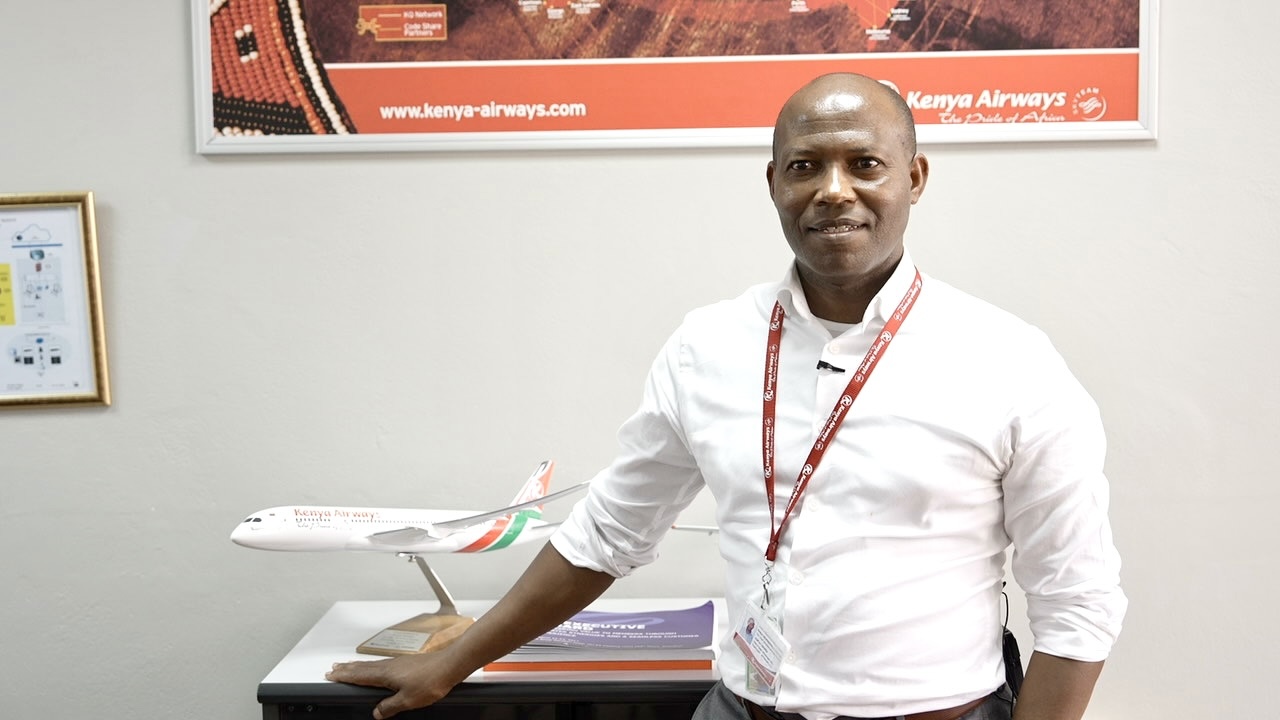[Interview] Kenya Airways Chief Information Officer on how the airline is embracing innovation

Fredrick Kitunga is the Chief Information and Data Officer at Kenya Airways. As a business technology leader, he oversees people, processes, and technologies within the Kenya Airways Technology organisation to deliver outcomes that support the business goals.
Frederick is also responsible for the digital transformation strategy as a core pillar for enabling business operational efficiency and effectiveness.
He has a background training in electrical engineering and has been in the technology space for over 27 years, in various sectors including energy, banking, telecommunications, and now aviation.
In this interview, he talks about how the airline is embracing innovation and the different green technology initiatives it’s also implementing.
As the Chief Information and Data Officer for a company like KQ, you must have a lot on your plate. Talk to us about some programmes you lead.
Indeed, KQ as an airline is very dynamic in its operations, and this calls for adaptability to a rapidly changing technological landscape. We pay particular attention to our customers needs, and that’s why we have invested in customer-centric and tailor-made solutions to efficiently serve our customers. Some of the key digitalisation programs I have delivered include:
- 15 below—an effective digital communication platform that enables the airline to offer hyper-personalised, automated communication to our customers at every stage of their journey.
- Asante Rewards is a program to reward our loyal customers. On this digital platform, customers are now able to seamlessly enroll and earn points every time they fly on Kenya Airways-operated flights from the comfort of their mobile devices [on the go].
- Business Process Automation: leveraging in-house capability to develop various solutions that drive efficiency and cost reduction. Among them are the implementation of online document management and approval processes, automation of reports, and direct operating cost tracking solutions.
- To address the evolving cybersecurity threats and assure business, I have led in the establishment of a robust 24/7 cybersecurity operations centre[SOC}]. This has security orchestration, automation, and response capabilities to collect data about cybersecurity threats and respond to security events with little human assistance.
- ICMS
What are some of the top technology trends you have seen in the aviation industry? (Talk about the ones KQ has implemented in recent years.)
The aviation industry is rapidly evolving and heavily dependent on technology. Some of the emerging technological trends that are impactful on our business include biometrics authentication at airports, AI-driven solutions for personalized services to customers, machine learning and large language modeling [ML and LLM] for predictive analysis for maintenance operations [MRO], demand planning, financial forecasting, and reporting.
How is KQ taking advantage of these trends to remain competitive?
Kenya Airways has implemented technology solutions that leverage these emerging technologies and include:
- Revenue Planning: We have in place a RevPlanner solution that enables our commercial team to accurately forecast and plan on demand for our routes for optimized revenue.
- Data analytics: we are now able to analyze our operational performance data (known as on-time performance, OTP) using modern data analytics tools to drive up our schedule integrity.
- Using AI and ML, we have been able to get real-time feedback from our customers across all the digital touchpoints, including social media and other digital channels. This helps to drive meaningful engagements with our customers for timely action.
- From an operational excellence perspective, we have implemented cutting-edge technology tools such as flight planning management systems for fuel optimization and route navigation. This enables our crew to fly routes and profiles that improve safety and efficiency while saving time and fuel.
Still on the trends. Technologies such as artificial intelligence (AI) have the potential to revolutionize the aviation industry. It can be used to do things like improve flight safety and even enhance the customer experience. Is KQ, at some point, going to embrace AI?
Kenya Airways (KQ), like many airlines globally, has the potential to significantly benefit from embracing artificial intelligence (AI) in various aspects of its operations.
- Customer Experience:
Personalized Services: AI-driven systems analyse passenger data to offer personalized recommendations for in-flight services, seat preferences, and travel itineraries.
Chatbots and Virtual Assistants: AI chatbots provide 24/7 customer support, handle inquiries and bookings, and improve overall customer service.
- Data Analysis:
Passenger Data Analysis: AI analyzes large volumes of passenger data to identify trends and insights, helping KQ make informed decisions on marketing, route planning, and service improvements.
Can you share some key technological initiatives that KQ has implemented recently to enhance the customer experience or operational efficiency?
- New Distribution Capability (NDC) Adoption: NDC Implementation: Kenya Airways adopted the International Air Transport Association’s (IATA) New Distribution Capability (NDC) standards. This allows for richer content and personalized offers for customers through various sales channels, improving the booking experience.
- Self-Service Kiosks: Automated Check-In: KQ introduced self-service kiosks at Jomo Kenyatta International Airport (JKIA) and other airports, enabling passengers to check-in, print boarding passes, and tag their baggage independently. This reduces waiting times and streamlines the check-in process.
- Cargo Management System: Efficient Cargo Handling: KQ has upgraded its cargo management system to enhance tracking, booking, and managing cargo shipments. This improves efficiency in cargo operations and offers better service to cargo customers.
One of the things we have seen you come up with is the KQ Fahari Innovation Hub. Talk to us about this hub; what does it exactly do?
The KQ Fahari Innovation Hub is an initiative by Kenya Airways designed to foster innovation and collaboration within the aviation industry and beyond.
- What kind of programs do you run at the hub?
- Innovation and Technology Development: Ideation and Prototyping: The hub provides a platform for generating new ideas and developing prototypes. It encourages creative thinking and problem-solving to address industry challenges.
- Start-Up Incubation and Acceleration: Support for Start-Ups The KQ Fahari Innovation Hub offers support to start-ups and entrepreneurs, providing them with resources, mentorship, and a collaborative environment to develop their ideas into viable businesses.
- Incubation Programs: The hub runs incubation programs where start-ups can access Kenya Airways’ resources, including office space, technical support, and industry expertise.
- Collaboration and Partnerships: Industry Partnerships: The hub facilitates partnerships between Kenya Airways and other stakeholders in the aviation and technology sectors, including universities, research institutions, and tech companies.
- Collaborative Projects: Through these partnerships, the hub works on collaborative projects that aim to drive innovation and address common industry challenges.
- Talent Development: Training and Workshops: The hub offers training programs, workshops, and seminars to equip participants with the skills and knowledge needed to innovate and excel in the aviation industry.
- Internship Opportunities: It provides internship opportunities for students and young professionals, allowing them to gain hands-on experience and contribute to innovative projects.
Why is innovation such a key component at KQ?
Innovation is a key component at Kenya Airways (KQ) for several compelling reasons, driving both strategic and operational benefits that are crucial for the airline’s growth and competitiveness.
You also won the Best Innovation and Most Impactful Breakthrough award last year. Talk to us about this award and what it means to you as a national carrier.
Winning the Best Innovation and Most Impactful Breakthrough award last year was a significant achievement for Kenya Airways (KQ), highlighting the airline’s commitment to excellence and innovation.
The Best Innovation and Most Impactful Breakthrough Award is typically given to organizations that demonstrate outstanding innovation and significant positive impact in their industry. For KQ, receiving this award was a recognition of the airline’s efforts in adopting cutting-edge technologies and implementing innovative strategies that have made a substantial difference in its operations and customer service.
How does technology contribute to KQ’s efforts toward sustainability and reducing its environmental impact?
Technology plays a critical role in Kenya Airways’ (KQ) efforts to enhance sustainability and reduce its environmental impact. Transitioning to digital processes for example reduces paper usage and waste. This includes electronic ticketing, digital boarding passes, and electronic flight bags (EFBs) for pilots, which replace traditional paper manuals and charts.
Are there specific initiatives related to green technology that you have implemented or plan to implement?
Kenya Airways (KQ) has implemented and is planning several specific initiatives related to green technology to enhance sustainability and reduce its environmental impact. Here are some notable initiatives:
Implemented Initiatives
- Fuel-Efficient Aircraft: Boeing 787 Dreamliner: KQ has invested in modern, fuel-efficient aircraft such as the Boeing 787 Dreamliner, which offers significant fuel savings and reduced emissions compared to older models.
- Flight Path Optimization: Advanced Navigation Systems: Implementing systems that optimize flight paths for fuel efficiency, helping to minimize fuel consumption and emissions.
- Electronic Flight Bags (EFBs): Digital Cockpit Solutions: Replacing traditional paper-based flight manuals with electronic flight bags, reducing paper waste, and improving operational efficiency.
- Ground Support Equipment (GSE): Electric Vehicles: Using electric ground support equipment and vehicles at airports to lower carbon emissions from ground operations.
- Sustainable Aviation Fuels (SAFs): Pilot Programs: Exploring and testing the use of sustainable aviation fuels that have a lower carbon footprint than conventional jet fuel.
- In-Flight Waste Management: Recycling Programs: Implementing waste management systems to sort and recycle in-flight waste, including plastics, paper, and food waste, to reduce landfill contributions.
Planned Initiatives
- Expansion of Sustainable Aviation Fuels: Broader Adoption: Increasing the use of SAFs across more flights and working with suppliers to ensure a steady supply of these fuels.
- Energy-Efficient Facilities: Solar Power: Installing solar panels and other renewable energy sources at KQ’s facilities and maintenance hangars to reduce reliance on fossil fuels.
Any closing remarks?
In closing, Kenya Airways (KQ) is committed to leveraging innovation and technology to enhance its operational efficiency, customer experience, and environmental sustainability. The airline’s various initiatives, such as the KQ Fahari Innovation Hub, the adoption of fuel-efficient aircraft, advanced navigation systems, and sustainable aviation fuels, underscore its dedication to leading the aviation industry into a more sustainable future.
By continuously investing in green technologies and fostering a culture of innovation, KQ is not only enhancing its competitive edge but also contributing to global efforts to reduce the environmental impact of aviation. These efforts reflect KQ’s commitment to responsible corporate stewardship, ensuring a positive impact on the environment and the communities it serves.
As KQ moves forward, it will continue to prioritize sustainability, efficiency, and customer satisfaction, setting a benchmark for other airlines and demonstrating that progress and environmental responsibility can go hand in hand. Thank you for the opportunity to discuss these important initiatives and the future of Kenya Airways. Safe travels and sustainable skies ahead!
Follow us on Telegram, Twitter, and Facebook, or subscribe to our weekly newsletter to ensure you don’t miss out on any future updates. Send tips to editorial@techtrendsmedia.co.ke


